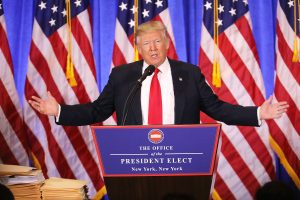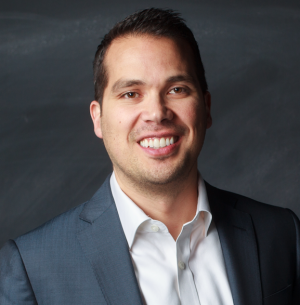The Dangers Of Hot Covfefe
Lawyers risk their credibility if they push the anti-Trump agenda too far.

(Photo by Spencer Platt/Getty Images)
Plaintiffs’ lawyers are in hysterics. The latest bombshell about Donald Trump Jr.’s meeting with a Russian attorney has ignited a firestorm among plaintiffs’ lawyers who have made it their mission to organize, sue, and do anything they can to take down President Trump.
But, for all the jaw-dropping and legitimately concerning facts that have been revealed since Trump took office, lawyers are risking their credibility by pushing it too far—both with the lawsuits they are filing and the arguments they are advancing via social media and on cable TV.

Happy Lawyers, Better Results The Key To Thriving In Tough Times
The New Anti-Trump Plaintiffs’ Bar
Trump has always been a lightning rod for plaintiffs’ lawyers. He was sued thousands of times pre-presidency. But now, Trump has become the greatest recruiter for the plaintiffs’ bar ever, spurring lawyers from wide-ranging areas to don the white hat of the plaintiffs’ world. Trump has been sued over 130 times in the first six months of his presidency by lawyers across the country. Norm Eisen and Richard Painter, chief ethics attorneys for Presidents Barack Obama and George W. Bush, respectively, have joined forces with liberal constitutional heavyweight Larry Tribe in one of the three major Emoluments Clauses lawsuits currently pending against Trump. Attorneys on all sides of the political spectrum, it seems, want to jump on the stop-Trump train.
Ironically, President Trump—the man in the plaintiff bar’s crosshairs—is a lot like the stereotypical plaintiffs’ lawyer himself. Both have flashy lifestyles that could be narrated by Robin Leach and a penchant for 24-karat gold-plated private jets. They both have nicknames: “The Gorilla,” “The Hammer,” “The Donald.” Their TV presence is a can’t-look-away combo of shock and, to some, schlock. And they both have egos that can be seen from space.
But there’s a significant difference between President Trump and the typical plaintiffs’ lawyer, and it’s the reason attorney Willie Gary—despite owning two private jets, Wings of Justice I and II—nicknamed himself “The Giant Killer.” Plaintiffs’ lawyers make their living fighting for the “little guy,” the oppressed, and the helpless. Trump claims to do this. But the plaintiffs’ bar, known as a bastion of liberalism, isn’t buying it. Trump’s travel ban, his proposed corporate tax cuts, and his support for a healthcare bill Trump himself described as “mean,” cause many in the plaintiffs’ bar to view Trump as the embodiment of everything they have spent their careers fighting. Trump masquerading as one of them, a defender of Joe Sixpack, offends them in a deep way. So plaintiffs’ lawyers are doing what they know best: suing.
Sponsored

Law Firm Business Development Is More Than Relationship Building

Happy Lawyers, Better Results The Key To Thriving In Tough Times

Curbing Client And Talent Loss With Productivity Tech

Law Firm Business Development Is More Than Relationship Building
Suing Trump May Pose Hazards to Your Health
The rush to sue Trump presents hazards, though. High-visibility public litigation can be as much about public perception as it is about law, and controlling the narrative is part of what landed Trump in the White House. Lawyers venturing into these waters, no matter how noble their motives, should proceed with caution.
The classic Pyrrhic victory of the modern plaintiffs’ bar was Liebeck v. McDonald’s Restaurants, the “hot coffee” case. The details of that case have been covered elsewhere at length, but in short, a jury awarded a plaintiff with third-degree pelvic burns enough money for her medical treatment, plus $3 million in punitive damages for McDonald’s disregard for the long list of customers who had previously been burned. Stella Liebeck and her attorney won a significant cash verdict off that case. They didn’t come close, however, to the money McDonald’s saved itself on future lawsuits by publicizing that case everywhere it possibly could. In large part thanks to publicity by McDonald’s and aligned industry voices, Liebeck was turned into a narrative of juries run amok. “Hot Coffee Case” is now an undeserved synonym for frivolous lawsuit. McDonald’s chose to work the refs, convincing large swaths of the nation that Liebeck and plaintiffs like her are irresponsible schmucks looking for a quick payday. Liebeck won in the court of law, but lost in the court of public opinion, and that loss has made life harder for plaintiffs ever since.
Unfortunately, many of the plaintiffs’ lawyers going after Trump risk facing this same sort of backlash. Take the lawyers representing the owners of a Washington wine bar in an “unfair competition” suit against Trump based on his ownership of the Trump International Hotel. The complaint, filed by a formidable legal team working pro bono that includes two George Washington University Law School professors, asks the court to order Trump to end the alleged unfair competition—a goal that can be accomplished by, among other alternatives, “Donald Trump resigning as President of the United States.” Suits like this, which are the legal equivalent of a “Hail Mary” pass, may appease the lawyers’ desire to take shots at Trump. In the process, however, they become fodder for fringe, far-right media outlets that spotlight the cases as emblematic of everything that’s wrong with “Trump haters” and their sue-happy lawyers.
Don Jr. and the Weaponizing of High Crimes
Sponsored

AI Presents Both Opportunities And Risks For Lawyers. Are You Prepared?

Generative AI at Work: Boosting e-Discovery Efficiency for Corporate Legal Teams
But it’s not just lawsuits. Members of the newfound Trump-slaying plaintiffs’ bar are also regulars on cable news and social media—a point that was driven home when news of the Don Jr.’s meeting with a Russian lawyer broke earlier this week. Within hours of the initial New York Times story (even before Don Jr. released the damaging email chain), Richard Painter, one of Trump’s most outspoken critics, conclusively tweeted “This is treason”—a crime punishable by death. To be clear: the Don Jr. story has massive political implications and raises serious questions about potential election-law violations. There’s more than plenty for lawyers to debate, right? So why do otherwise well-regarded lawyers like Painter have to take the extra step of concluding, without qualification, that this amounts to leveling war against the United States such that execution could be warranted?
Every time I hear lawyers immediately go full-throttle on high crimes like treason, I can hear Alan Dershowitz screaming on my shoulder. Now, I’ve got to admit, the Alan Dershowitz of today is not the lawyer from the O.J. “Dream Team.” Dershowitz seems angry, goes on “wild rants,” and the arguments of the once-famous liberal are now a mainstay of pro-Trump talking points. But, for all of Dershowitz’s legal noise, there is one point he’s made recently that he may have right: lawyers opposing Trump are too anxious to say every tweet, every word, every meeting is a heinous criminal act.
I get it, plaintiffs’ lawyers. You’re angry. You can’t believe the commander-in-chief would tweet about a cable news pundit “bleeding badly from a facelift.” You’re terrified that the guy who proposed forming an “impenetrable Cyber Security unit” with Vladimir Putin has his finger on the nuclear codes. You’re frustrated that every day you see a president who is advancing policies that are anathema to everything you believe to your core while breaking public discourse down into a WWE-style free-for-all. These are all fair points for you to make on Twitter, on TV, in op-eds, or anywhere else you can find an audience. In fact, that discussion is necessary; we as a country need to decide what we will tolerate from the president, and what it means to be fit to serve. But all of that anger doesn’t mean that everything Trump does is illegal—even if it ultimately turns out that some of it may be.
When all you have is a hammer, everything starts to look like a nail. Attorneys want justice, so they file suits and speak out in the public sphere and try to use the law to see justice done. But all lawyers, especially those who are going after the most powerful man in the world, need to pick their battles carefully.
And there are battles worth fighting. Whatever your political leanings, few would argue that the issues raised in the travel ban or “voter fraud panel” litigation aren’t of public significance. Trump has served up plenty of major policy issues for lawyers to fight about, so you don’t need to overplay your hand. If you do, it will only backfire against you if you lose. Rest assured that Trump will not hesitate to take every tiny victory he obtains and trumpet it on Twitter and Fox News as proof that all cases and legal arguments advanced against him are meritless “witch hunts.”
Everyone wants to be the heroic rebel pilot, hopping in their X-Wing, taking that run at the Death Star, and striking a blow against the “evil empire.” But, with apologies to Obi-Wan, if they fail to strike Trump down, they risk making him more powerful than they can possibly imagine.

James Goodnow
James Goodnow is an attorney, author, commentator and Above the Law columnist. He is a graduate of Harvard Law School and Santa Clara University. He regularly appears in the national broadcast and print media, including CNN, HLN, Forbes and more. You can connect with James on Twitter (@JamesGoodnow) or by emailing him at [email protected].







